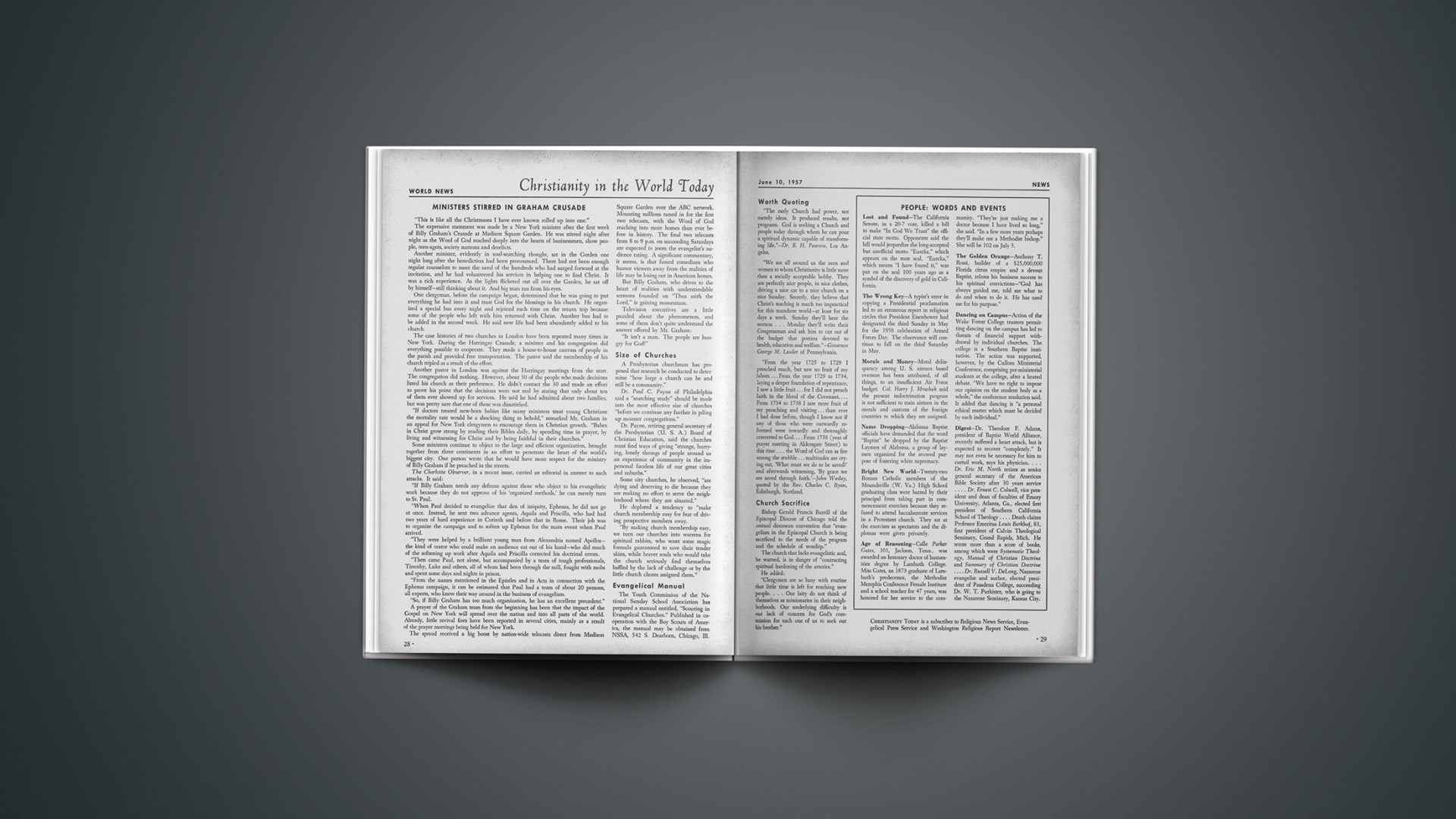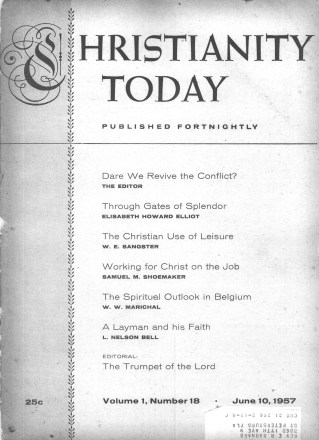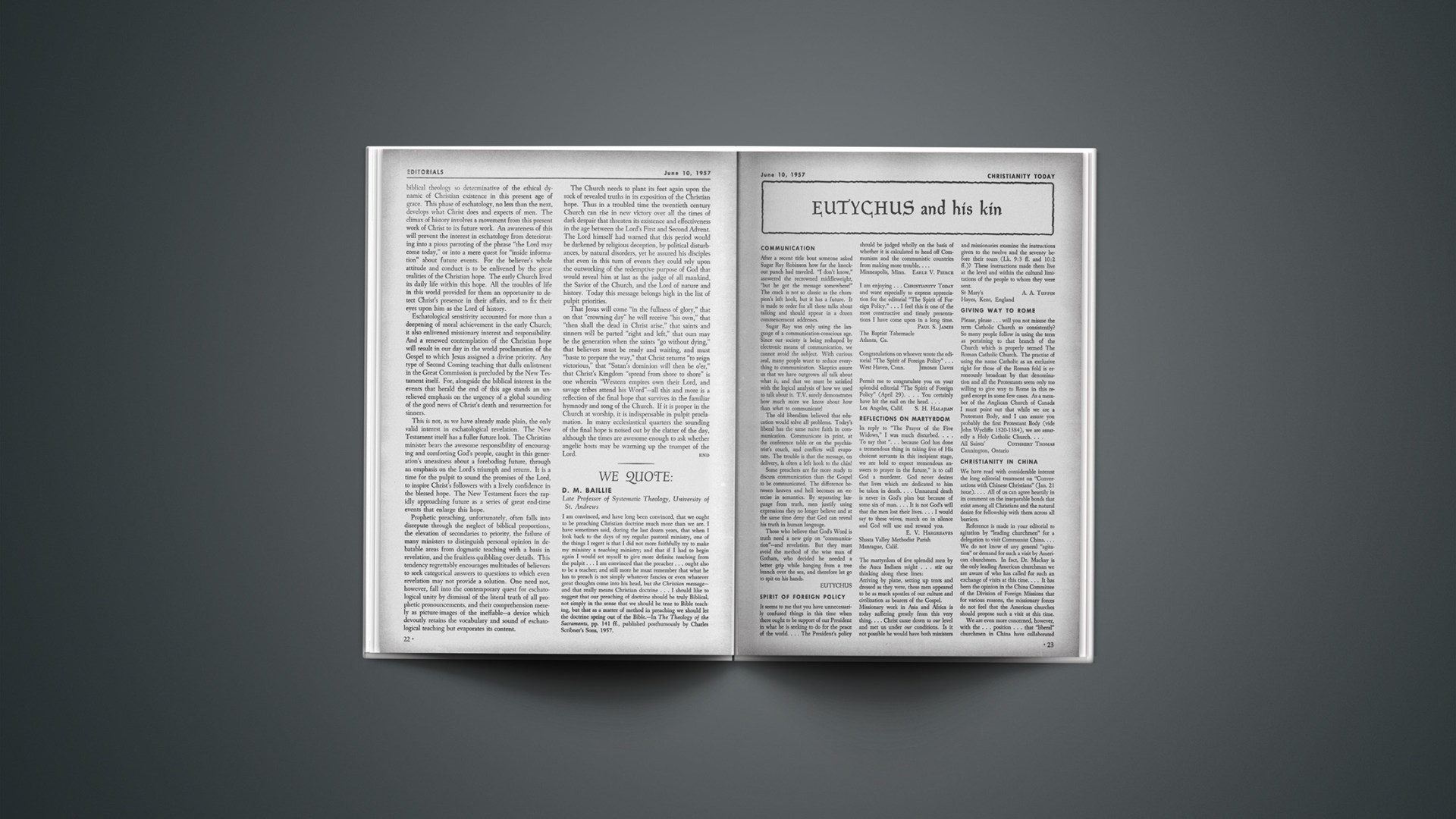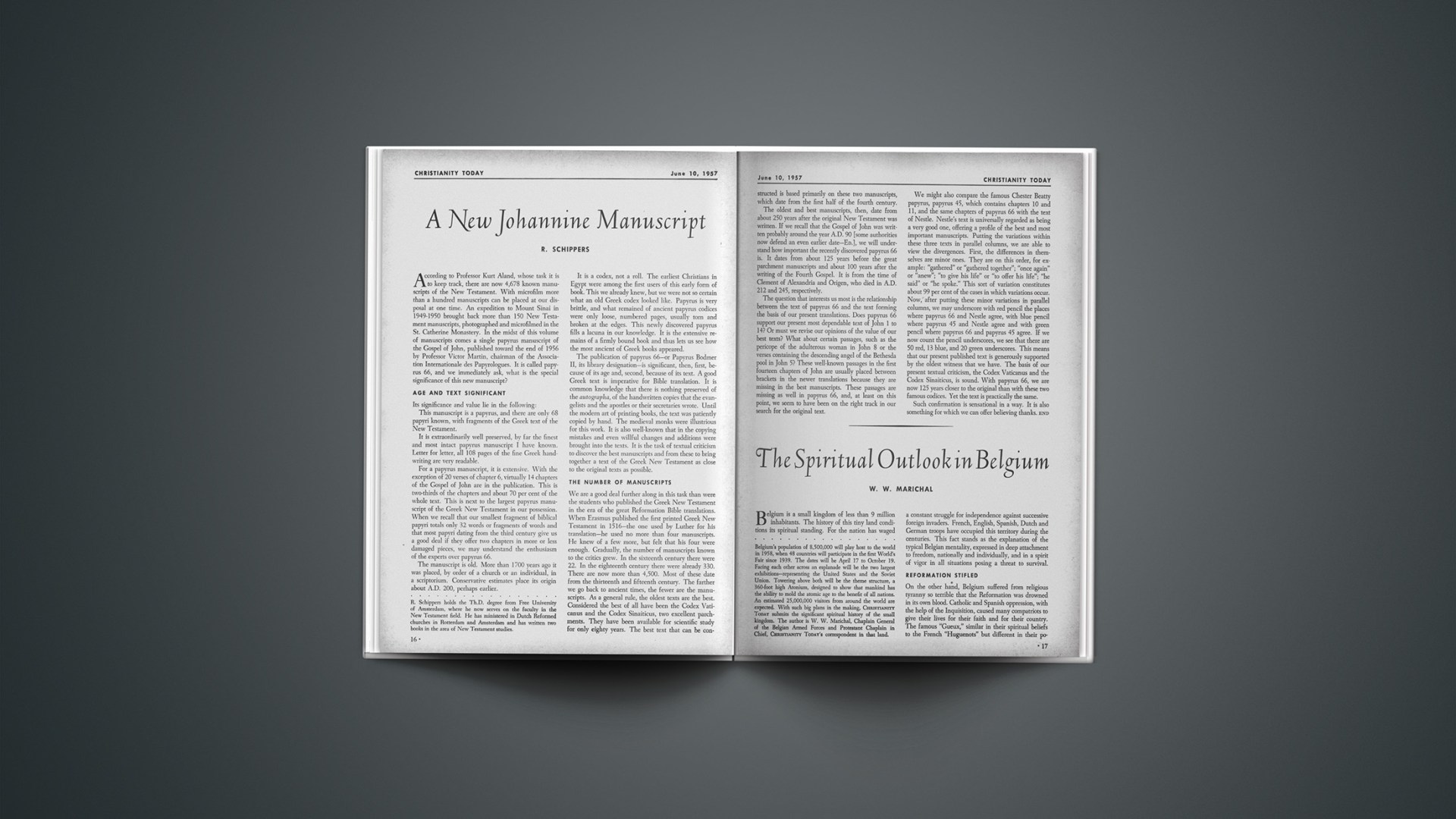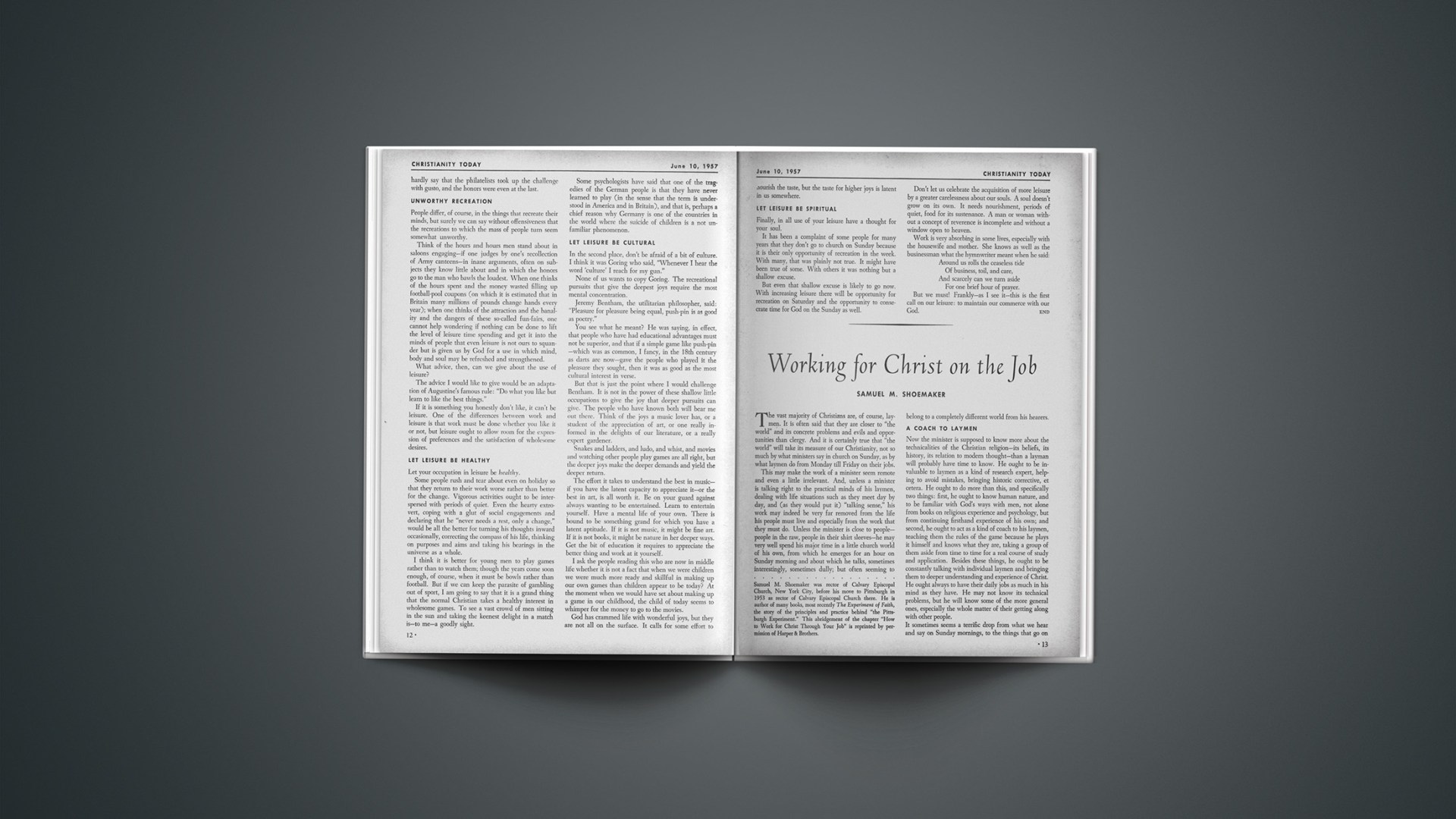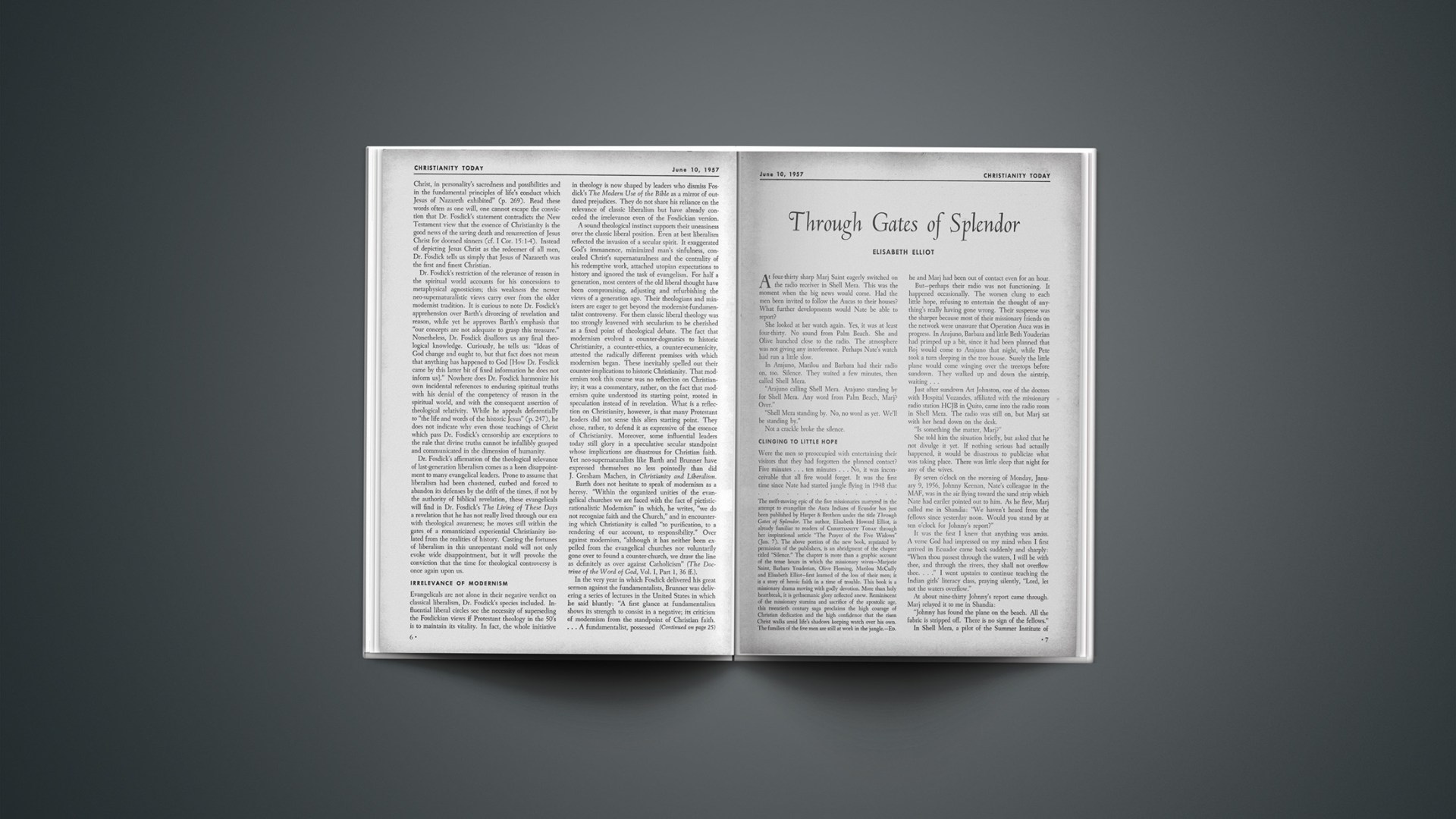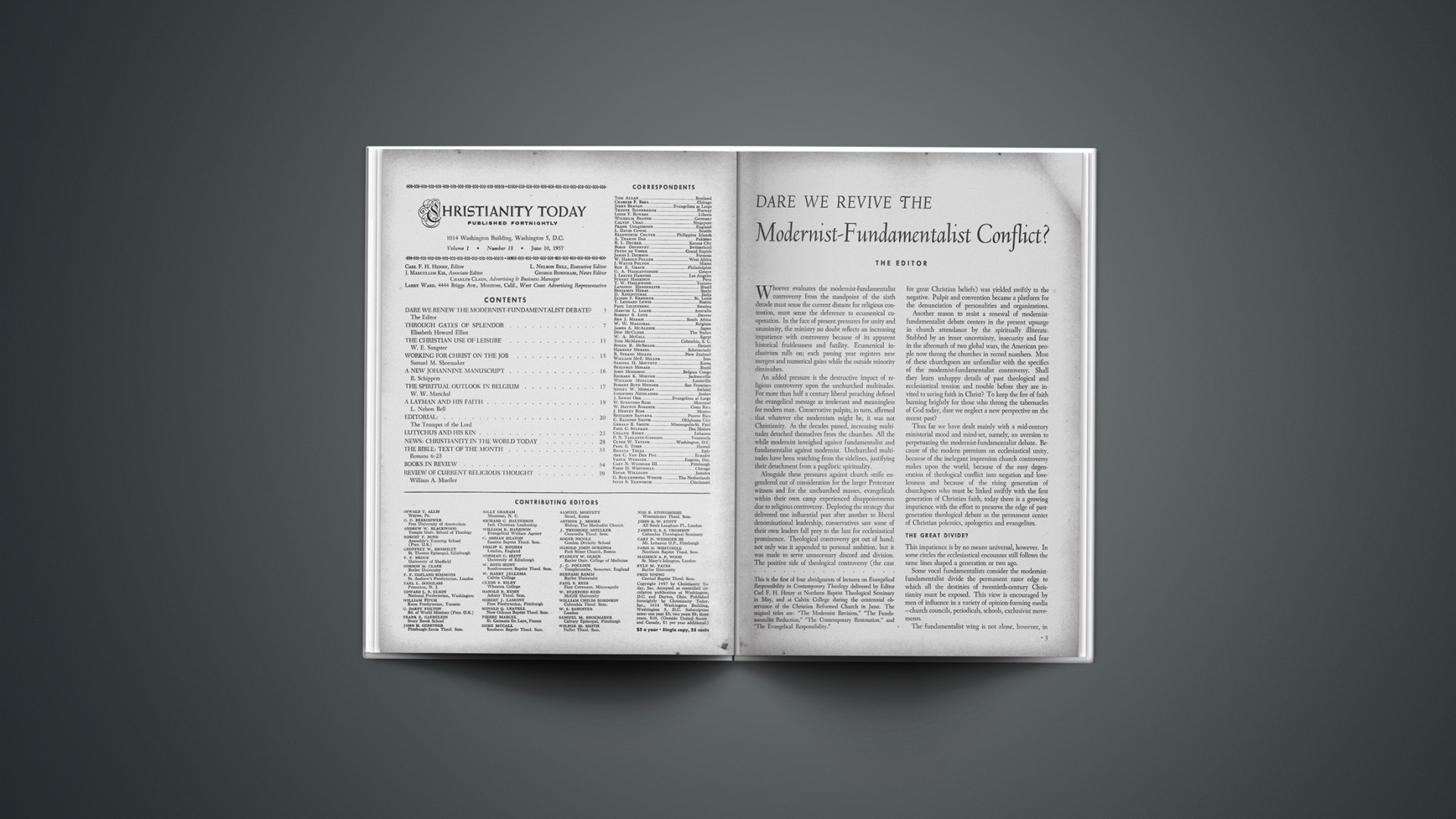WORLD NEWS
Christianity in the World Today
“This is like all the Christmases I have ever known rolled up into one.”
The expressive statement was made by a New York minister after the first week of Billy Graham’s Crusade at Madison Square Garden. He was stirred night after night as the Word of God reached deeply into the hearts of businessmen, show people, teen-agers, society matrons and derelicts.
Another minister, evidently in soul-searching thought, sat in the Garden one night long after the benediction had been pronounced. There had not been enough regular counselors to meet the need of the hundreds who had surged forward at the invitation, and he had volunteered his services in helping one to find Christ. It was a rich experience. As the lights flickered out all over the Garden, he sat off by himself—still thinking about it. And big tears ran from his eyes.
One clergyman, before the campaign began, determined that he was going to put everything he had into it and trust God for the blessings in his church. He organized a special bus every night and rejoiced each time on the return trip because some of the people who left with him returned with Christ. Another bus had to be added in the second week. He said new life had been abundantly added to his church.
The case histories of two churches in London have been repeated many times in New York. During the Harringay Crusade, a minister and his congregation did everything possible to cooperate. They made a house-to-house canvass of people in the parish and provided free transportation. The pastor said the membership of his church tripled as a result of the effort.
Another pastor in London was against the Harringay meetings from the start. The congregation did nothing. However, about 30 of the people who made decisions listed his church as their preference. He didn’t contact the 30 and made an effort to prove his point that the decisions were not real by stating that only about ten of them ever showed up for services. He said he had admitted about two families, but was pretty sure that one of these was dissatisfied.
“If doctors treated new-born babies like many ministers treat young Christians the mortality rate would be a shocking thing to behold,” remarked Mr. Graham in an appeal for New York clergymen to encourage them in Christian growth. “Babes in Christ grow strong by reading their Bibles daily, by spending time in prayer, by living and witnessing for Christ and by being faithful in their churches.”
Some ministers continue to object to the large and efficient organization, brought together from three continents in an effort to penetrate the heart of the world’s biggest city. One person wrote that he would have more respect for the ministry of Billy Graham if he preached in the streets.
The Charlotte Observer, in a recent issue, carried an editorial in answer to such attacks. It said:
“If Billy Graham needs any defense against those who object to his evangelistic work because they do not approve of his ‘organized methods,’ he can merely turn to St. Paul.
“When Paul decided to evangelize that den of iniquity, Ephesus, he did not go at once. Instead, he sent two advance agents, Aquila and Priscilla, who had had two years of hard experience in Corinth and before that in Rome. Their job was to organize the campaign and to soften up Ephesus for the main event when Paul arrived.
“They were helped by a brilliant young man from Alexandria named Apollos—the kind of orator who could make an audience eat out of his hand—who did much of the softening up work after Aquila and Priscilla corrected his doctrinal errors.
“Then came Paul, not alone, but accompanied by a team of tough professionals, Timothy, Luke and others, all of whom had been through the mill, fought with mobs and spent some days and nights in prison.
“From the names mentioned in the Epistles and in Acts in connection with the Ephesus campaign, it can be estimated that Paul had a team of about 20 persons, all experts, who knew their way around in the business of evangelism.
“So, if Billy Graham has too much organization, he has an excellent precedent.”
A prayer of the Graham team from the beginning has been that the impact of the Gospel on New York will spread over the nation and into all parts of the world. Already, little revival fires have been reported in several cities, mainly as a result of the prayer meetings being held for New York.
The spread received a big boost by nation-wide telecasts direct from Madison Square Garden over the ABC network. Mounting millions tuned in for the first two telecasts, with the Word of God reaching into more homes than ever before in history. The final two telecasts from 8 to 9 p.m. on succeeding Saturdays are expected to zoom the evangelist’s audience rating. A significant commentary, it seems, is that famed comedians who humor viewers away from the realities of life may be losing out in American homes.
But Billy Graham, who drives to the heart of realities with understandable sermons founded on “Thus saith the Lord,” is gaining momentum.
Television executives are a little puzzled about the phenomenon, and some of them don’t quite understand the answer offered by Mr. Graham:
“It isn’t a man. The people are hungry for God!”
Size Of Churches
A Presbyterian churchman has proposed that research be conducted to determine “how large a church can be and still be a community.”
Dr. Paul C. Payne of Philadelphia said a “searching study” should be made into the most effective size of churches “before we continue any further in piling up monster congregations.”
Dr. Payne, retiring general secretary of the Presbyterian (U. S. A.) Board of Christian Education, said the churches must find ways of giving “strange, hurrying, lonely throngs of people around us an experience of community in the impersonal faceless life of our great cities and suburbs.”
Some city churches, he observed, “are dying and deserving to die because they are making no effort to serve the neighborhood where they are situated.”
He deplored a tendency to “make church membership easy for fear of driving prospective members away.
“By making church membership easy, we turn our churches into warrens for spiritual rabbits, who want some magic formula guaranteed to save their tender skins, while braver souls who would take the church seriously find themselves baffled by the lack of challenge or by the little church chores assigned them.”
Evangelical Manual
The Youth Commission of the National Sunday School Association has prepared a manual entitled, “Scouting in Evangelical Churches.” Published in cooperation with the Boy Scouts of America, the manual may be obtained from NSSA, 542 S. Dearborn, Chicago, Ill.
Worth Quoting
“The early Church had power, not merely ideas. It produced results, not programs. God is seeking a Church and people today through whom he can pour a spiritual dynamic capable of transforming life.”—Dr. B. H. Pearson, Los Angeles.
“We see all around us the men and women to whom Christianity is little more than a socially acceptable hobby. They are perfectly nice people, in nice clothes, driving a nice car to a nice church on a nice Sunday. Secretly, they believe that Christ’s teaching is much too impractical for this mundane world—at least for six days a week. Sunday they’ll hear the sermon … Monday they’ll write their Congressman and ask him to cut out of the budget that portion devoted to health, education and welfare.”—Governor George M. Leader of Pennsylvania.
“From the year 1725 to 1729 I preached much, but saw no fruit of my labors.… From the year 1729 to 1734, laying a deeper foundation of repentance, I saw a little fruit … for I did not preach faith in the blood of the Covenant.… From 1734 to 1738 I saw more fruit of my preaching and visiting … than ever I had done before, though I know not if any of those who were outwardly reformed were inwardly and thoroughly converted to God.… From 1738 (year of prayer meeting in Aldersgate Street) to this time … the Word of God ran as fire among the stubble … multitudes are crying out, ‘What must we do to be saved?’ and afterwards witnessing, ‘By grace we are saved through faith.’—John Wesley, quoted by the Rev. Charles C. Ryan, Edinburgh, Scotland.
Church Sacrifice
Bishop Gerald Francis Burrill of the Episcopal Diocese of Chicago told the annual diocesean convention that “evangelism in the Episcopal Church is being sacrificed to the needs of the program and the schedule of worship.”
The church that lacks evangelistic zeal, he warned, is in danger of “contracting spiritual hardening of the arteries.”
He added:
“Clergymen are so busy with routine that little time is left for reaching new people.… Our laity do not think of themselves as missionaries in their neighborhoods. Our underlying difficulty is our lack of concern for God’s commission for each one of us to seek out his brother.”
Merger Of Churches
The following special report was written by Dr. Robert J. Lamont, pastor of First Presbyterian Church, Pittsburgh, Penna. and a contributing editor of CHRISTIANITY TODAY.
The 169th General Assembly of the Presbyterian Church in the U. S. A., held recently in Omaha, Nebraska, unanimously ratified the vote of every presbytery in favor of union with the United Presbyterian Church of America.
The 872 commissioners stood with bowed heads and prayed for God’s blessings on the action they had taken. If the U. P. General Assembly, meeting in June, approves, the union will be consummated at Pittsburgh in May, 1958.
Dr. Harold R. Martin, pastor of Second Presbyterian Church, Bloomington, Illinois, was elected moderator. A high spiritual note that characterized the meetings of the Assembly was sounded by Dr. Martin at the induction ceremonies when he said, “I am only a sinner saved by grace and I earnestly covet your prayers for the blessing of the Holy Spirit on the Church of Christ.”
“The Whole Gospel for the Whole World” was the Assembly theme.
As part of the long-range benevolence advance, the commissioners unanimously approved a $43,000,000 budget for 1958. This action committed the church to a benevolence goal of $54,000,000 by 1962. The step of faith brought forth the spontaneous singing of the Doxology by the Assembly in the packed Omaha Civic Auditorium. Stewardship of time and the tithe of substance was urged.
In an effort to keep its constituency and the public informed, the Assembly created the “Office of Information.” Dr. Murray S. Stedman was elected director.
Mrs. J. R. Salisbury of Kansas City, Missouri, president of the National Council of Presbyterian Women’s Organizations, which has a membership of over 625,000, told of the program of prayer, study, service and giving—world wide in its witness for Jesus Christ.
A truly significant paper, “The Presbyterian Church in the U. S. A. and the Public Schools,” was presented by the Board of Christian Education after more than two years of research. Among other things, the report:
1. defines certain areas of common loyalties of the public school and church and expresses a strong conviction that Presbyterians must remain loyal to public education;
2. demands continuance of the traditional principle of separation of Church and State;
3. enunciates a policy limiting the promotion of Presbyterian parochial schools;
4. opposes the support of independent and parochial schools through the use of public funds;
5. maintains that the public school teacher is in a strategic role to exercise a keen sense of Christian vocation;
6. urgently requests Presbyterians in this country to work actively for the improved financial support of public schools.
The report was enthusiastically adopted.
A committee on the rewording of the Shorter Catechism recommended that the questions and answers on the Shorter Catechism remain unaltered.
The Assembly paid tribute to more than 2,800 national missionaries by receiving unanimously the report of the National Missions Board, which provides for college scholarship assistance for the children of national missionaries. A corporation was created to sell bonds in the amount of $10,000,000 to be used to finance on a loan basis new church development.
As part of the report of the Committee on Evangelism, prayer was offered for the blessing of God upon the Billy Graham Crusade in New York City. The Assembly telegraphed assurance of prayer and support to Dr. Graham.
The Board of Foreign Missions reported that the task of the Church had reached a crucial moment—brought about not by its failure but by its success in establishing indigenous churches in many lands. To facilitate the world mission and to cooperate with new churches, the Assembly voted to establish a commission on Ecumenical Mission and Relations to succeed the present Board of Foreign Missions and the Permanent Commission on Interchurch Relations.
One could not help but be impressed by the dedication and the evangelical concern, not only by the board and agencies but by the commissioners themselves, as in prayerful democracy the Church was committed again to the “Whole Gospel for the Whole World.”
In Christ’s Name
Pressure to keep Christians from praying in Christ’s name at public meetings was denounced in a joint statement issued by the Greater Miami Ministerial Association and the Greater Miami Council of Churches.
The resolution said:
“We record herewith our profound disapproval of any such attempts to bind the conscience of any man or woman of any faith.
“We believe that such acts and attitudes are disruptive of the spirit of fair play, tolerance and understanding among our people and represent a denial of the principles of religious freedom and the right of free speech.”
The churchmen said any prayer offered in public or semi-public or private assembly should be “in accordance with the religious convictions of the person offering the prayer—whether he be Protestant, Catholic or Jew, or a representative of any other religious faith or sect.”
The resolution did not name any specific cases. But it said that “various pressures have been exerted in the public schools, in parent teachers association groups, in certain civic clubs and in a variety of public and semi-public functions where custom, tradition or the solemnity of the occasion indicate that prayer should be offered, to prescribe and proscribe the character of that prayer in a way that is an affront to the integrity of the minister’s or layman’s faith and a violation of his conscience.
“Specifically, Christian people have been requested, or forbidden, as the case may be, not to pray as Christians, sometimes upon pain of punishment, wherever it could be administered.”
In an accompanying explanation, the Rev. J. Wayte Fulton, Jr., president of the ministerial group, said some of the pressure has been the result of misunderstanding of how important it is for a Christian to pray in Christ’s name.
From 5 To 500
In the spring of 1857 groups from five Michigan communities—Grand Rapids, Polkton (Coopersville), Vriesland, Graafschaap and Noordeloos—withdrew from the Reformed Church of America and formed the beginning of the Christian Reformed denomination.
There were five churches, 750 people, and one minister, who traveled around in an ox cart.
Vern Boerman, writing in the Muskegon Chronicle, said Abraham Lincoln was campaigning to be a senator when the denomination was born.
The writer added:
“They were part of those Reformed Christians in the Netherlands who had suffered hardship because they protested against a State Church. They were part of those who came from the Old World land of dikes and windmills to America, the haven for people from many lands.
“In its century of existence the Christian Reformed denomination has had many forms of growth and change—from the Dutch language to English, modifying from a primarily Dutch church to one including Americans of many backgrounds, founding a church-supported college and seminary, establishing a system of domestic and foreign missions, working on neighborhood evangelism, sharing in the construction of Christian grade and high schools, establishing local and national radio broadcasts, publishing magazines, books and literature.
“Today, the Christian Reformed Church reaches from Nova Scotia to California, from Alaska to Florida. It embraces a quarter-million people in over 500 churches.”
Elaborate celebrations will mark the centennial observance.
Hoover’s Challenge
The following statement, concerning crime and church responsibility, was made especially for CHRISTIANITY TODAY by John Edgar Hoover, director of the Federal Bureau of Investigation:
“Thoughtful citizens everywhere are alarmed over the continued upsurge in youthful lawlessness. Last year arrests of young people under 18 years increased 17.3 percent over the previous year in our cities. Population in the 10–17 age group increased less than three percent in the same period.
There are, of course, many causes contributing to juvenile delinquency, but one which I have repeatedly observed is the absence of individual moral character in our youth. Let us never forget that Christ emphasized the inherent worth of the individual. Teaching this fact is the joint responsibility of the home and church.
“Unfortunately, many homes today do not provide a standard of moral character as a guide to young people. We cannot ignore that our churches do not reach all young people and many of them have little familiarity with Christ’s teachings. Obviously, this presents a real challenge to our churches. The material richness and glitter of the life of our times provides many temptations for our youth. If they do not know Christ and the Word of God, and lack the standard for guidance, we can expect a continuing increase in the number of young people who are brought before the courts each year. When the Word of God is absent, chaos may enter young lives. Our churches must reach the youth of America.”
Missionary Alliance
Member churches and other supporting organizations of the Christian and Missionary Alliance contributed a record $3,718,668 for its work during 1956, an increase of $284,266 over 1945.
Of the total, $2,299,586 was spent to support the Alliance’s mission work.
These reports were made at the organization’s 60th annual meeting recently in Charlotte, N. C. More than 1,000 delegates attended.
President H. L. Turner of New York said the interdenominational agency sent 103 new missionaries into 22 foreign fields last year. He reported the total number of active missionaries abroad to be 786.
All The Answers
Before it tries to solve problems of society, psychiatry should first solve its own problems, Dr. Francis J. Braceland, president of the American Psychiatric Association, told the group convention in Chicago.
He stated:
“To attempt to pose all the answers to problems ranging from preventing international wars to bickering over back fences is to invite public discredit.… Psychiatry still can’t agree, for example, on whether mental illness is a chemical derangement of the body or an end result of emotional wounds in children.”
The likelihood, he added, “is that both the mind and the body are involved in the problem. And perhaps even these aren’t the whole story. Apparently the problem is wrapped up with man’s whole being, his higher aspirations, the meaning of his life, the understanding of himself and his place in the order of things.”
Spreading The Word
The number of languages and dialects into which at least one book of the Bible has been translated passed the 1,100-mark during 1956, The American Bible Society reported at its 141st annual meeting.
The entire Bible has been published in 210 languages and dialects; a complete Testament in an additional 270 and at least a book in 629.
Business Transaction
Three acts of Congress were necessary for the Acworth (Ga.) Methodist Church to buy seven acres of land from the Army Engineers Corps.
A bill was first introduced by Rep. Henderson H. Lanham (D.-Ga.) to give the Army Engineers permission to sell the land.
Congress approved the bill but the House and Senate quickly recalled the measure from President Eisenhower’s desk. The White House discovered that the bill erroneously specified 9,990 feet instead of 990 as the depth of the tract. Both Houses passed the measure again and sent it back to the President.

